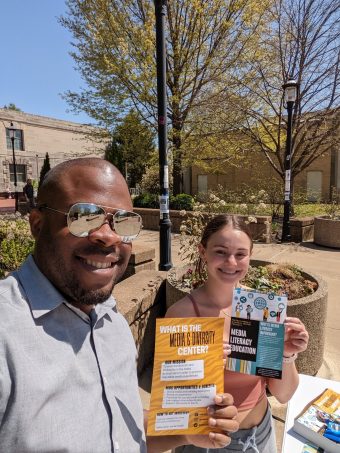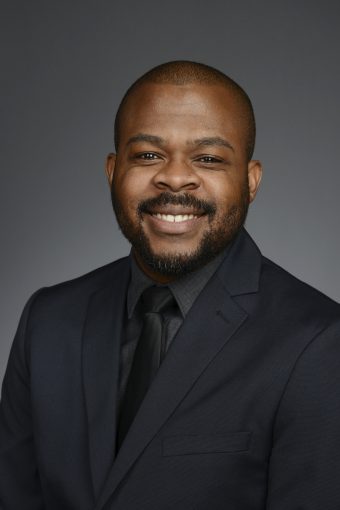May 10, 2022
Contact: Eric Stann, 573-882-3346, StannE@missouri.edu
At first Julius Riles, an assistant professor of communication at the University of Missouri, imagined himself helping the world in a seat across from a therapy patient. With his interest in psychology, becoming a therapist seemed like the natural choice for a full-time career. But as he took psychology classes at the University of Illinois Urbana-Champaign, Riles discovered that a career in therapy probably wasn’t what he wanted — a future in the communication field was far more appealing.
He used the remainder of his electives to tack on a communication major and was even invited to conduct research in the communication department.
“At that point, I was asking myself, ‘What do I want to do moving forward?’” Riles said. “I realized, ‘Oh, I kind of like what I’m doing here.’”
So, he received his masters and doctoral degrees in communication at the UIUC, and along the way, he discovered his research area — the interplay between media use and social relationships.
Now, as the co-founder of the Media and Diversity Center at MU, Riles is helping the world by conducting research about how portrayals of marginalized groups in the media can affect real-world interactions and behaviors.
How media affects reality
In his research, Riles explores how media not only influences our perceptions of different social groups and identities, but also how media influences the way we engage with those groups and identities.
“What are the models for interpersonal behavior that exist within the media landscape that could inform how certain social groups might interact with one another?” Riles said.
He’s applied this question, and others like it, to his studies about racial depictions and political polarization. But while he was working on his dissertation, he decided to focus on a stigmatized identity that is not as visible — being a person with a mental health condition.
What he discovered about the perceptions of mental illness surprised him.
“I was just blown away by the sheer negativity of those perceptions,” Riles said. “I was wondering where they came from and why they were so pronounced.”
His research about media portrayals of people with mental health conditions led him to some answers.
Messages from the screen
In one study, Riles surveyed the most popular films from the last 30 years to see if there were significant differences in the relationships of characters who did or did not have mental illness. He found that characters with mental health conditions tend to be portrayed in more intimate relationships than those who did not have mental health conditions.
“Which is a good thing, but it’s less of a good thing in the sense that it’s more intimate than professional,” Riles said. “We don’t see people with mental health conditions in professional settings engaged in work and being responsible for achieving goals within the workplace.”
In another study, he found that people with mental health conditions were disproportionately associated with danger, violence and aggression — verbal, physical and sexual.
Beyond the film industry alone, Riles said schizophrenia is portrayed more in the “media environment” than it exists in the real world. That makes the condition easy to conflate with post-traumatic stress disorder or bipolar disorder.
People in the media who are dangerous and violent are often described as having a mental health condition, even if the description is speculation. These media portrayals exist even while most people managing these health conditions do not engage in erratic, violent behaviors, he said.
“The more people consume that type of media, the more their descriptions tend to be more stereotypical, associated with violence, associated with danger, associated with potential harm to the community,” Riles said. “People who were consuming more of these messages also indicated a decrease in comfort at the idea of social engagement.”
Riles said one way to stop these negative portrayals is for the film industry to work on decoupling those stereotypes. But he is also using his research to help rewrite the narrative.

Julius Riles co-founded the Media and Diversity Center in 2017. There’s about a dozen undergraduate students, half a dozen graduate students and more than a dozen faculty from institutions across the nation affiliated with the center.
Disrupting media perceptions
Riles co-founded the Media and Diversity Center in 2017. The goal of the center is to promote awareness about where marginalization exists in mainstream and digital media environments. There’s about a dozen undergraduate students, half a dozen graduate students and more than a dozen faculty from institutions across the nation affiliated with the center.
Together, they’re combating this marginalization by seeking opportunities for inclusivity. To do this, they host film viewing events, community workshops and media literacy training.
“We agree with other media literacy proponents that media literacy should almost certainly be provided earlier than reading literacy,” Riles said. “Young children are exposed to mediated distortions and marginalized depictions before they can even read. At that age, we're already starting to internalize some of the stereotypes.”
Doing this work can incite tangible changes for the people in those stigmatized communities.
For example, Riles hopes that the less people who have a mental health condition feel stigmatized, the more likely they will seek clinical assistance. According to the Centers for Disease Control and Prevention (CDC), more than 50% of people in the U.S. will be diagnosed with a mental illness or disorder in their lifetime.
“People with mental illness are all of us,” Riles said. “We should stop using these extreme examples to understand this health identity because it's distorted and leads to marginalization and discrimination, which is horrific.”





